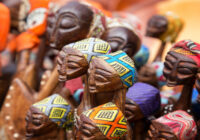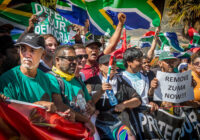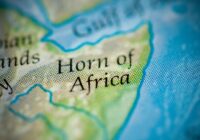Some of Macron’s diplomatic initiatives are in danger of looking more like convenient photo opportunities if they fail to deliver results.
French President Emmanuel Macron rarely admits that he lacks experience when it comes to high office and foreign affairs. He may have demurred from admitting to Time magazine (which recently published a new interview with him) that he wants to be “leader of the free world,” but actions speak louder than words. In crafting his bold approach to foreign affairs, Macron has opted for a risky strategy: mask inexperience with bravado.
From Bonn to Bamako, France’s young leader has embarked on a series of interventions that critics could argue have more to do with improving his own public image than finding solutions to the planet’s most pressing problems. He has demonstrated a particular penchant for flexing his underdeveloped foreign policy muscles in Africa, where his keenness to act without first assessing the consequences of rashly thought out decisions could well come back to haunt him further down the line.
Capitalizing on fears about the ongoing threat posed by Islamist extremism at home, Macron earlier this month used a two-day visit to Abu Dhabi to signal France’s willingness to tackle jihadi groups in other parts of the world once ISIS has been completely routed from its crumbling “caliphate.”
Despite the fact that France’s overstretched military is already committed to counterterrorism operations against al-Qaeda-backed militants in parts of its former colonial territories in West Africa as well as patrolling the streets of Paris, Macron appeared happy to suggest he might be agreeable to extending operations to the Horn of Africa, Libya and the Sahel, taking on other Islamist organizations such as Boko Haram.
In a clear extension of the so-called Françafrique policy, Macron seems to think the country’s colonial links to West Africa bestow upon him license to act in the region and play the “tough on terror” card against Islamist extremism. France’s contribution to the G5 Sahel initiative is a living example of this, giving the young president a signature opportunity to lead. And he has taken full advantage: Macron is the project’s chief global advocate, convincing his global counterparts to help fund and arm an alliance of Sahel arms to secure borders and fight militants.
In the short term, these tactics may play well with a French electorate that has only just seen an end to a two-year state of emergency. However, offering to jump in bed with a number of unreliable partners could cause serious problems for France further down the line. Burkina Faso, Chad, Mali, Mauritania and Niger (the five members of the Sahel initiative) are all fragile states whose histories are a series of ethnic conflicts, personal rule and military coups. Chad’s president, Idriss Deby, is among the region’s longest-serving leaders, having assumed power in 1990, while the other leaders have done little to improve governance.
Macron can hardly argue those leaders are getting any better. Mauritania’s president and former coup leader Mohamed Ould Abdel Aziz looks to gearing up for an undemocratic power grab as part of a bid to remain in office past his constitutional mandate. Earlier this month, opposition parties staged rallies to pressure the president not to run for a third term in office, describing his rule as “a real ordeal for the country.” Human rights groups have condemned the government’s treatment of dissenters.
The state regulator ordered the country’s five privately owned news outlets to shut down on procedural grounds, while Mohamed Cheikh Ould Mohamed, a blogger who was sentenced to death for criticizing Mauritania’s caste system in what the courts deemed was a blasphemous act, has become a byword for political abuse. If Aziz manages to hold onto power in Mauritania, Macron could be faced with awkward questions about France’s commitment to democracy, especially since many have seen the G5 Sahel force as rubber-stamping an administration hungry for international recognition.
Macron’s confused response to the ongoing migrant crisis is another potential Achilles’ heel. He initially pledged to fall in line with German Chancellor Angela Merkel’s approach while on the election trail, promising that he would commit France to taking its fair share of refugees. Since then, the French president has been notably inconsistent on immigration over his first half year in office.
Aside from being called out for suggesting Africa’s true challenge is “civilizational,” Macron has pursued a number of policies that call into question his purported enthusiasm for Merkel’s open door policy. The French president’s plan for migrant requests for asylum to be processed in Africa was labelled “racist and inhumane” in the European Parliament, while refugee charities have been highly critical of the way the French government has treated migrants forced to sleep in the streets following the closure of the Calais Jungle shantytown last October.
Some of Macron’s other diplomatic initiatives do appear to have bolstered his standing on the world stage, but are in danger of looking more like convenient photo opportunities if they fail to deliver results. In July, the French president hosted talks in Paris that resulted in Libya’s two rival leaders agreeing to a ceasefire and free and fair elections early next year. Four months on from those talks, stability on the ground in Libya seems a long way off. The UN envoy to the country warns Tripoli it is not ready for elections.
Similarly, Macron in August brought much fanfare to a new Presidential Council for Africa, designed to help him identify and address challenges facing the continent. Aside from the odd appointment, little has been heard of the council’s progress since.
Much of Africa’s Sahel is highly unstable and requires well-planned diplomatic assistance from France and the rest of Europe. Unfortunately, Macron’s regional policy is wafer-thin and is primarily motivated by a desire to improve the president’s standing on the global stage. While that has garnered the French president short-term PR wins and a number of photo ops, it will likely end up doing him (and more importantly, the people of the Sahel) more harm than good.
The views expressed in this article are the author’s own and do not necessarily reflect Fair Observer’s editorial policy.
Photo Credit: Frederic Legrand – COMEO / Shutterstock.com
Support Fair Observer
We rely on your support for our independence, diversity and quality.
For more than 10 years, Fair Observer has been free, fair and independent. No billionaire owns us, no advertisers control us. We are a reader-supported nonprofit. Unlike many other publications, we keep our content free for readers regardless of where they live or whether they can afford to pay. We have no paywalls and no ads.
In the post-truth era of fake news, echo chambers and filter bubbles, we publish a plurality of perspectives from around the world. Anyone can publish with us, but everyone goes through a rigorous editorial process. So, you get fact-checked, well-reasoned content instead of noise.
We publish 2,500+ voices from 90+ countries. We also conduct education and training programs
on subjects ranging from digital media and journalism to writing and critical thinking. This
doesn’t come cheap. Servers, editors, trainers and web developers cost
money.
Please consider supporting us on a regular basis as a recurring donor or a
sustaining member.
Will you support FO’s journalism?
We rely on your support for our independence, diversity and quality.







